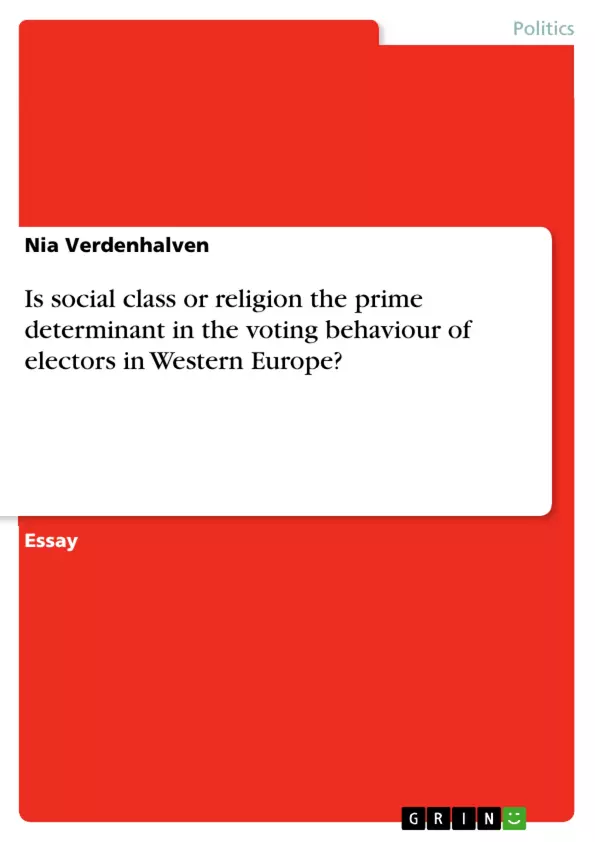Conventionally, social cleavages have been widely accepted as the prime determinant in the voting behaviour of electors in the western world. In largely religious countries Christianity was seen as main factor of people’s voting pattern, whereas in secular western countries social class was regarded as the strongest influence. However, in recent decades the prediction of electoral behaviour has become more and more problematic, as religious faith has declined and the traditional contrast of social classes began to be more difficult to distinguish. This essay will examine the impact of religion and social class as well as the increasing influx of ultra-right parties and influence of the growing number of ethnic minorities on voting behaviour in Germany and France, and will attempt to demonstrate that despite the former importance of religion and the changes of society during the post-war period, the fundamental influence on voting behaviour is social class in both countries.
Inhaltsverzeichnis (Table of Contents)
- Introduction
- Traditional influence of religion of voting behaviour in Germany and France
- Religious belief in Germany and France today
- Influence of religion on electoral behaviour nowadays
- Traditional influence of class on voting behaviour
- Changes of social class in Germany and France
- Social Class and the far-right
- Electoral behaviour of Muslims in Germany and France
- Which is the main determinant, class or religion?
Zielsetzung und Themenschwerpunkte (Objectives and Key Themes)
This essay aims to explore the impact of religion and social class on voting behaviour in Germany and France, considering the influence of ultra-right parties and the growing number of ethnic minorities. It will argue that despite the historical importance of religion and the changes in society since the post-war period, social class remains the fundamental influence on voting behaviour in both countries.
- Influence of religion on voting behaviour
- Influence of social class on voting behaviour
- Rise of ultra-right parties
- Impact of ethnic minorities on voting behaviour
- Comparative analysis of Germany and France
Zusammenfassung der Kapitel (Chapter Summaries)
- Introduction: This section introduces the concept of social cleavages and their traditional role in voting behaviour, highlighting the challenges to these models in recent decades due to declining religious faith and evolving social structures.
- Traditional influence of religion of voting behaviour in Germany and France: This chapter examines the historical influence of religion on voting behaviour in Germany and France. It highlights the strong presence of Christian democratic parties during the post-war period, emphasizing the importance of religious principles and issues such as Church schools and divorce laws.
- Religious belief in Germany and France today: This section explores the decline of religious belief in both Germany and France, highlighting the impact of re-unification in Germany and the growing number of individuals identifying as agnostic. It discusses the potential shift towards values such as individualism and tolerance over traditional Christian values.
- Influence of religion on electoral behaviour nowadays: This chapter examines the continuing influence of religion on voting behaviour, suggesting that electorates in regions with a strong historical religious influence still tend to vote for centre-right parties. It discusses the potential for religious faith to transcend social differences and impact voting patterns, even among working-class individuals.
- Traditional influence of class on voting behaviour: This section explores the historical impact of social class on voting behaviour, highlighting the emergence of left-right political orientations during the Industrial Revolution. It discusses the traditional association of blue-collar workers with socialist parties and industrialists with conservative parties, emphasizing the role of class in determining values and political preferences.
- Changes of social class in Germany and France: This chapter examines the evolving nature of social class in Germany and France, highlighting the impact of educational advancements and changes in the employment structure. It discusses the blurring of traditional occupational distinctions and the decline in the proportion of individuals identifying as working-class, leading to the emergence of "catch-all" political parties.
Schlüsselwörter (Keywords)
This essay explores the determinants of voting behaviour in Western Europe, focusing on the influence of social class and religion in Germany and France. Key themes include the decline of religious faith, the evolving nature of social class, the rise of ultra-right parties, and the impact of ethnic minorities on voting patterns. It utilizes the Social Cleavage Model to analyze the historical and contemporary influence of these factors on electoral behaviour, highlighting the challenges to traditional models of voting behaviour in a changing social landscape.
Frequently Asked Questions
Is social class still the main factor in European voting?
The essay argues that despite societal changes and the decline of traditional class boundaries, social class remains the fundamental influence on voting behavior in Germany and France.
How has the influence of religion on voting declined?
With increasing secularization and agnosticism, traditional Christian values play a smaller role, although religious regions still tend to favor center-right parties.
What is the "Social Cleavage Model"?
It is a sociological model suggesting that deep-seated social divisions (like class or religion) historically determine the political alignments of the electorate.
How do ethnic minorities, like Muslims, vote in France and Germany?
The essay examines how ethnic and religious minorities integrate into the political landscape, often showing distinct voting patterns influenced by their social and economic status.
Why are "catch-all" parties becoming more common?
As occupational distinctions blur and class identity weakens, parties must appeal to a broader, more diverse spectrum of voters to remain competitive.
- Citar trabajo
- Nia Verdenhalven (Autor), 2007, Is social class or religion the prime determinant in the voting behaviour of electors in Western Europe?, Múnich, GRIN Verlag, https://www.grin.com/document/67342



